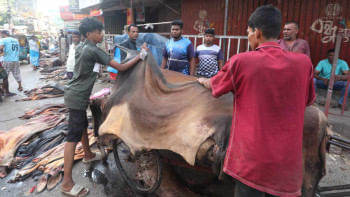‘Hazardous’ air: DoE asks Dhaka residents to wear masks outdoors

The Department of Environment (DoE) has advised people in Dhaka to wear masks if the air pollution in the capital reaches "hazardous" level.
When the Air Quality Index (AQI) value for particle pollution is between 101 and 150, air quality is considered "unhealthy for sensitive groups", between 150 and 200 is "unhealthy", between 201 and 300 is said to be "very unhealthy", while a reading of 301+ is considered "hazardous", posing serious health risks to residents.
Sick people, children, and elderly people were also advised not to go out of their houses unnecessarily, according to a DoE press release.
The release the title of "Air Pollution Health Protection Advice", the DoE said if the AQI score in Dhaka exceeds 300, there will be an alert on their website advising people to wear masks when they go out.
The alert will be withdrawn if the AQI score falls below 300, it said.
Considering the current situation, information regarding air pollution and health risks is being disseminated regularly on the website of the Department of Environment, read the release.
Besides, monitoring data from 16 Continuous Air Quality Monitoring System (CAMS) in other divisional and industrial cities of the country including Dhaka is being disseminated regularly on the website through real-time automation.
The AQI, an index for reporting daily air quality, informs people how clean or polluted the air of a certain city is and what associated health effects might be a concern for them.
The AQI in Bangladesh is based on five pollutants: particulate matter (PM10 and PM2.5), NO2, CO, SO2, and ozone.
Dhaka has long been grappling with air pollution issues. Its air quality usually turns unhealthy in winter and improves during the monsoon.

 For all latest news, follow The Daily Star's Google News channel.
For all latest news, follow The Daily Star's Google News channel. 



Comments